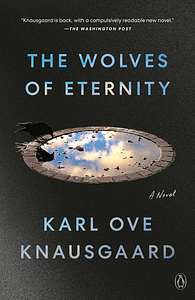You need to sign in or sign up before continuing.
Take a photo of a barcode or cover
emotional
mysterious
medium-paced
Plot or Character Driven:
Character
Strong character development:
Complicated
Loveable characters:
Complicated
Diverse cast of characters:
No
Flaws of characters a main focus:
Complicated
In the second novel of his new series, Knausgård revisits the situation from the first without reusing any of the characters; it also feels more expansive and less misanthropic. I support the authors trying to write about realities they know from research vs. personal life; the portrayal of Russia here felt believable if a little lost in time. The Russian characters felt a little wooden and driven more by their ideas than their humanity, especially by contrast with the Norwegian protagonist. Still believable. As with earlier works, you will run into pages more suited for a nonfiction essay than a novel. This aspect felt less extreme than in "The Morning Star." Overall, this is a novel I would love to edit down, but would not have liked to have missed.
DNF.
After thoroughly enjoying Morgenstjernen, this one was a huge letdown. The main character is sort of insufferable and I just couldn’t go through another 600 pages of slow pace and monotonous dialogue.
After thoroughly enjoying Morgenstjernen, this one was a huge letdown. The main character is sort of insufferable and I just couldn’t go through another 600 pages of slow pace and monotonous dialogue.
dark
mysterious
reflective
tense
medium-paced
Plot or Character Driven:
Character
Loveable characters:
Complicated
Diverse cast of characters:
No
adventurous
challenging
medium-paced
Plot or Character Driven:
Character
Strong character development:
No
Loveable characters:
Complicated
Diverse cast of characters:
No
Flaws of characters a main focus:
No
This is the book I like the least in the 3 part series. The part about Russia was really a drag and it was not a page turner as the other books.
Have a hard time seeing how this should relate to the other books in the series
Have a hard time seeing how this should relate to the other books in the series
My 12th (!) Knausgaard book, The Wolves of Eternity is as creepy and profound as it is expansive. Though a slow roll to get going, with KOK’s lengthy, often-times mundane prose dragging the first act down, it eventually turns into a quick read, following the lives of two half-siblings, Syvert and Alevtina.
KOK packs a lot into this narrative and because of that, it's nearly impossible to summarize in this format. We get: American capitalism, music, the totalitarianism of the Soviet Union, biological communication between trees, shamanism, poetry, Russian language, infidelity, radiation, dreamstates, lengthy philosophical discourses on life and death, eternal life, and extensions of aging.
Syvert is a Norwegian man, just returning home from the army, looking after his brother after his mother becomes sick; Alevtina is a Russian single mother, who is exploring a PhD thesis on communication between trees.
But more or less, this book is about two half-siblings trying to uncover the mysteries of their father, who died when Syvert was young and Alevtina wasn’t even born.
Of course, it’s Knausgaard so things devolve, or evolve, into long academic texts on the meaning of life and death and man’s attempt to delay or defeat death, this time through the spokesperson of a somewhat obscure scientist that KOK spends a lot of time with. Meanwhile a mysterious star appears in the sky, flipping on its head all our expectations of death and granting a lively energy to the dead…
A book that combines academia, with theory, with fantasy, with grim sci-fi, with autofiction, with poetry, the Wolves of Eternity is not for everyone, but will satisfy KOK fans and leave first-time readers questioning what the hell they just read.
KOK packs a lot into this narrative and because of that, it's nearly impossible to summarize in this format. We get: American capitalism, music, the totalitarianism of the Soviet Union, biological communication between trees, shamanism, poetry, Russian language, infidelity, radiation, dreamstates, lengthy philosophical discourses on life and death, eternal life, and extensions of aging.
Syvert is a Norwegian man, just returning home from the army, looking after his brother after his mother becomes sick; Alevtina is a Russian single mother, who is exploring a PhD thesis on communication between trees.
But more or less, this book is about two half-siblings trying to uncover the mysteries of their father, who died when Syvert was young and Alevtina wasn’t even born.
Of course, it’s Knausgaard so things devolve, or evolve, into long academic texts on the meaning of life and death and man’s attempt to delay or defeat death, this time through the spokesperson of a somewhat obscure scientist that KOK spends a lot of time with. Meanwhile a mysterious star appears in the sky, flipping on its head all our expectations of death and granting a lively energy to the dead…
A book that combines academia, with theory, with fantasy, with grim sci-fi, with autofiction, with poetry, the Wolves of Eternity is not for everyone, but will satisfy KOK fans and leave first-time readers questioning what the hell they just read.
challenging
dark
emotional
informative
inspiring
mysterious
reflective
sad
slow-paced
Plot or Character Driven:
A mix
Strong character development:
Yes
Loveable characters:
Yes
Diverse cast of characters:
No
Flaws of characters a main focus:
Yes
challenging
dark
mysterious
reflective
slow-paced
Plot or Character Driven:
Character
Strong character development:
No
Loveable characters:
Complicated
Diverse cast of characters:
No
Flaws of characters a main focus:
Yes
emotional
reflective
medium-paced
Plot or Character Driven:
A mix
Strong character development:
Yes
Loveable characters:
Yes
Diverse cast of characters:
N/A
Flaws of characters a main focus:
No




